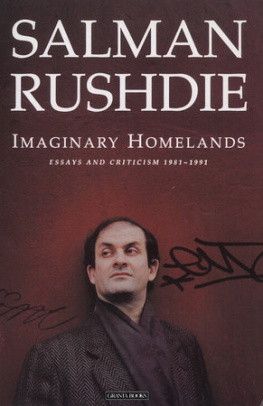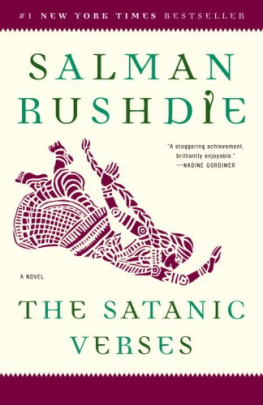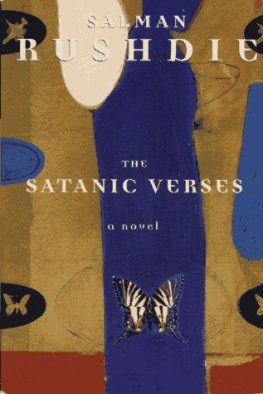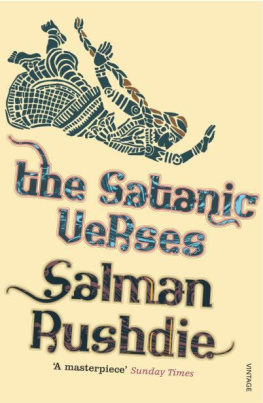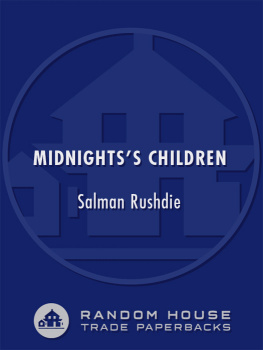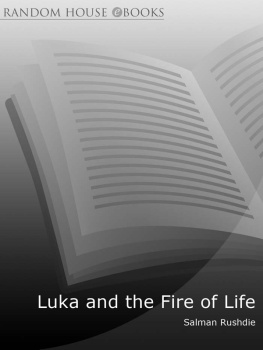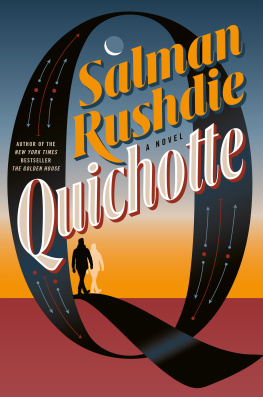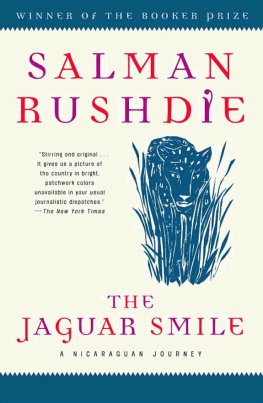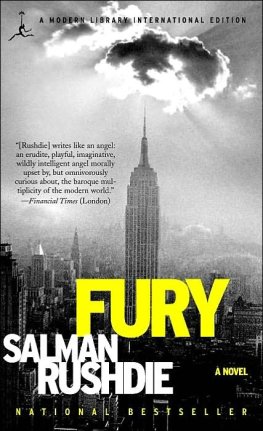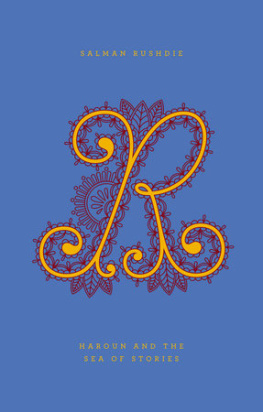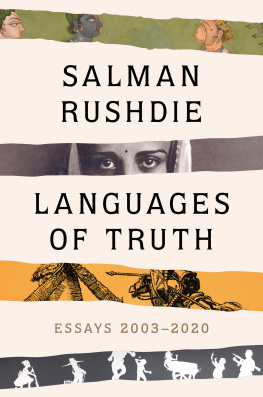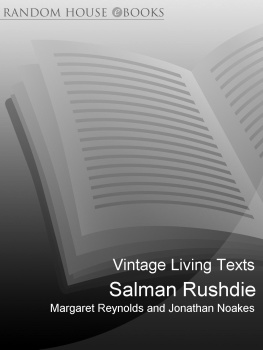To my mother
Negin Rushdie
with my love
SALMAN RUSHDIE
IMAGINARY HOMELANDS
ESSAYS AND CRITICISM 1981-1991
Copyright Salman Rushdie, 1981, 1982, 1983, 1984, 1985, 1986, 1987, 1988, 1989, 1990, 1991
All rights reserved
Some of the selections in this book first appeared in London Review of Books, The Guardian, Index on Censorship, Observer, Granta, The Times, American Film, New Society, The New York Times, The Washington Post, The New Republic, The Times Literary Supplement, and Independent on Sunday.
ISBN 978-1-6237-3012-3
CONTENTS
INTRODUCTION
The essay from which this collection takes its title was my contribution to a seminar about Indian writing in English held in London during the Festival of India in 1982. In those days Indira Gandhi was back as Indias premier. In Pakistan, the Zia regime was consolidating its power in the aftermath of the execution of Zulfiqar Ali Bhutto. Britain was in the early throes of the Thatcher revolution, and in the United States, Ronald Reagan was still an unregenerate Cold Warrior. The structures of the world retained their uninspiringly familiar form.
The upheavals of 1989 and 1990 changed all that. Now that were contemplating a transformed international scene, with its new possibilities, uncertainties, intransigences and dangers, it seems not inappropriate to pull together our thoughts on the rapidly receding decade in which, as Gramsci would have said, the old was dying, and yet the new could not be born. In this interregnum there arises a great diversity of morbid symptoms, Gramsci suggested. This book is an incomplete, personal view of the interregnum of the 1980s, not all of whose symptoms, it has to be said, were morbid.
In 1981 I had just published my second novel, and was enjoying the unique pleasure of having written, for the first time, a book that people liked. Before Midnights Children, I had had one novel rejected, abandoned two others, and published one, Grimus, which, to put it mildly, bombed. Now, after ten years of blunders, incompetence and commercials for cream cakes, hair colourants and the Daily Mirror, I could begin to live by my pen. It felt good.
Almost all the important Indo-Anglian writers were at the London seminar: Nirad C. Chaudhuri, Anita Desai, Raja Rao, Mulk Raj Anand among them. Of the big names, only R. K. Narayan was absent, though Id been told earlier that hed accepted the invitation. Narayan is so courteous that he always accepts, somebody told me, but he never shows up. It was exhilarating for me to meet and listen to these writers. But there were worrying moments, too; indications of some participants desire to describe Indian culturewhich I had always thought of as a rich mixture of traditionsin exclusive, and excluding, Hindu terms.
One distinguished novelist began his contribution by reciting a Sanskrit sloka. Then, instead of translating the verse, he declared: Every educated Indian will understand what Ive just said. This was not simply a form of intellectual grandeur. In the room were Indian writers and scholars of every conceivable backgroundChristian, Parsi, Muslim, Sikh. None of us had been raised in a Sanskritic tradition. We were all reasonably educated, however; so what were we being told? Perhaps that we werent really Indian?
Later in the day, an eminent Indian academic delivered a paper on Indian culture that utterly ignored all minority communities. When questioned about this from the floor, the professor smiled benignly and allowed that of course India contained many diverse traditionsincluding Buddhists, Christians and Mughals. This characterization of Muslim culture was more than merely peculiar. It was a technique of alienation. For if Muslims were Mughals, then they were foreign invaders, and Indian Muslim culture was both imperialist and inauthentic. At the time we made light of the gibe, but it stayed with me, pricking at me like a thorn.
A decade later, India has arrived at a full-blown crisis of descriptions. Religious militancy threatens the foundations of the secular state. Many Indian intellectuals now appear to accept the Hindu nationalist definitions of the state; minority groups respond with growing extremisms of their own. It is perhaps significant that there is no commonly used Hindustani word for secularism; the importance of the secular ideal in India has simply been assumed, in a rather unexamined way. Now that communalist forces would appear to have all the momentum, secularisms defenders are in alarming disarray. And yet, if the secularist principle were abandoned, India could simply explode. It is a paradoxical fact that secularism, which has been much under attack of late, outside India as well as inside it, is the only way of safeguarding the constitutional, civil, human and, yes, religious rights of minority groups. Does India still have the political will to insist on this safeguard? I hope so. We must all hope so. And we shall see.
The first three sections of this volume deal with subcontinental themes. is about literature. Indo-Anglian literature is presently in excellent shape. Many new writers made their reputations in the 1980sVikram Seth, Allan Sealy, Amitav Ghosh, Rohinton Mistry, Upamanyu Chatterjee, Shashi Tharoor, and moreand are producing work of growing confidence and originality. If only the political scene were as healthy! But, alas, the damage done to Indian life by the Emergency, Mrs Gandhis period of authoritarian rule between 1974 and 1977, is now all too plain. The reason why so many of us were outraged by the Emergency went beyond the dictatorial atmosphere of those days, beyond the jailing of opponents and the forcible sterilizations. The reason was (as I first suggested six years ago in the essay here entitled Dynasty) that it was during the Emergency that the lid flew off the Pandoras box of communal discord. The box may be shut now, but the goblins of sectarianism are still on the loose. Indian painters like Vivan Sundaram rose nobly to the challenge of the Emergency. No doubt Indian writers and artists will respond with equal skill to the new crisis. Bad times, after all, traditionally produce good books.
The fourth section deals primarily with movies and television. I have tinkered only a little with the original form of these pieces, but I should say that, seven years on, I find Outside the Whale a little unfair to George Orwell and to Henry Miller, too. I have not changed my mind about Richard Attenboroughs film Gandhi, but it must be accepted that the films influence outside India was often very positive; radical and progressive groups and movements in South America, Eastern Europe and southern Africa, too, found it uplifting. The piece about Handsworth Songs stimulated a lively debate among black British film-makers, some of it supportive of my views, some of it critical, all of it fascinating and, I think, helpful. And one footnote to the piece about Satyajit Ray. When I met him, he was shooting scenes for The Home and the World in an old zamindars mansion in the depths of rural Bengal. He rightly thought it the perfect setting for his movie. I found that I needed it, too, and it became the model for the dreammansion, Perownistan, occupied by Mirza Saeed Akhtar and his wife in the Titlipur sections of The Satanic Verses. (The giant banyan infested by butterflies wasnt there, however. I saw that in southern India, not far from Mysore.)
contains five pieces about the experience of migrants, primarily Indian migrants to Britain. Of these, The New Empire Within Britain requires a few words of comment, because of its rather strange afterlife. It was originally written for the Opinions slot in the very early days of Channel 4. (It was the second programme in the series, following E. P. Thompson.) The many British blacks and Asians who phoned in or wrote agreed, virtually unanimously, that the lecture had done no more than tell the simple truth. To them, I had gone no further than the ABC of racial prejudice in Britain. There was also, unsurprisingly, a hostile response from some members of the white community, though they were outnumbered by other white Britons who had found the piece informative and useful. My purpose had been simple: to tell the white majority how life in Britain all too often felt to members of racial minority groups. (Ive been in a minority group all my lifea member of an Indian Muslim family in Bombay, then of a mohajirmigrantfamily in Pakistan, and now as a British Asian.) By articulating a grievance, I could help, or so I hoped, to build bridges of understanding.
Next page
